You are using an out of date browser. It may not display this or other websites correctly.
You should upgrade or use an alternative browser.
You should upgrade or use an alternative browser.
Another Big Win For Putin!!!
- Thread starter 88m3
- Start date
-
- Tags
- putin russia vladimir world news
More options
Who Replied?ill
Superstar
Serbians love white girls
88m3
Fast Money & Foreign Objects
Ukraine ally of ex-President Yanukovych found dead
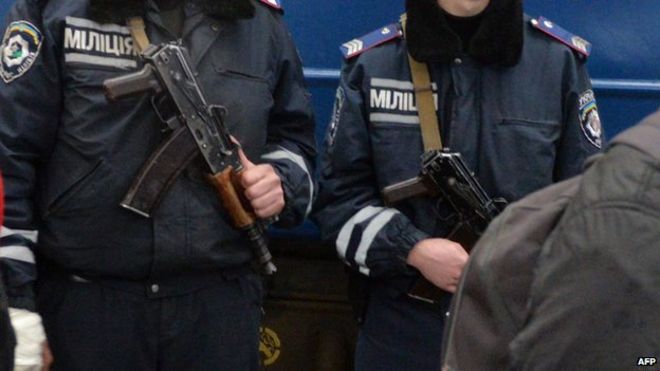
Police in Kiev say they are investigating the death
A Ukrainian opposition politician, Oleg Kalashnikov, has been found dead with gunshot wounds in Kiev - the latest ally of the former government to have died in suspicious circumstances.
Mr Kalashnikov had been involved in the "anti-Maidan" protests in support of deposed President Viktor Yanukovych.
It is not clear if he was murdered or committed suicide. Police say an investigation has been launched.
At least eight Yanukovych allies have died suddenly in the last three months.
Most of the deaths are said to have been suicides. However, officials say it was possible some were killed or forced to take their lives.
Commentators in Ukraine have accused supporters, as well as opponents, of the current pro-Western government of involvement in the deaths.
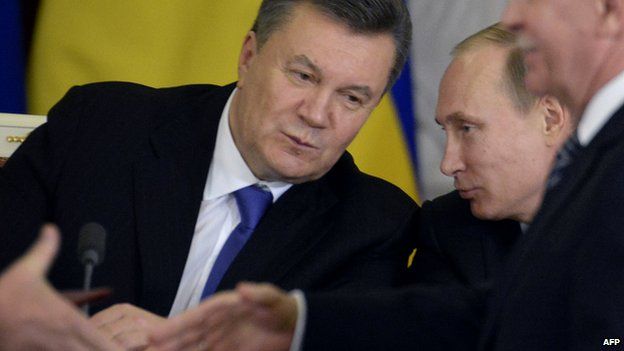
Viktor Yanukovych was overthrown, in part, because of he favoured closer ties with Russia
The BBC's David Stern in Kiev says no motive has emerged linking the deaths and no arrests have been made.
Mr Kalashnikov was a former deputy in parliament and a member of Mr Yanukovych's Party of Regions.
Accounts of his death differ, with some sources saying his body was found outside his flat in Kiev and others saying it was found within.
Mr Yanukovych fled Ukraine in February last year, after months of increasingly violent protests against him, centred on the Maidan, Kiev's main square.
He later reappeared in Russia. The government that succeeded him reversed his opposition to closer ties with the European Union - a major factor behind the protests.
It has since been plunged into a conflict with pro-Russian separatist rebels in the country's east.
http://www.bbc.com/news/world-europe-32329512
dropping em left and right lately

- 4 hours ago
- From the sectionEurope

Police in Kiev say they are investigating the death
A Ukrainian opposition politician, Oleg Kalashnikov, has been found dead with gunshot wounds in Kiev - the latest ally of the former government to have died in suspicious circumstances.
Mr Kalashnikov had been involved in the "anti-Maidan" protests in support of deposed President Viktor Yanukovych.
It is not clear if he was murdered or committed suicide. Police say an investigation has been launched.
At least eight Yanukovych allies have died suddenly in the last three months.
Most of the deaths are said to have been suicides. However, officials say it was possible some were killed or forced to take their lives.
Commentators in Ukraine have accused supporters, as well as opponents, of the current pro-Western government of involvement in the deaths.

Viktor Yanukovych was overthrown, in part, because of he favoured closer ties with Russia
The BBC's David Stern in Kiev says no motive has emerged linking the deaths and no arrests have been made.
Mr Kalashnikov was a former deputy in parliament and a member of Mr Yanukovych's Party of Regions.
Accounts of his death differ, with some sources saying his body was found outside his flat in Kiev and others saying it was found within.
Mr Yanukovych fled Ukraine in February last year, after months of increasingly violent protests against him, centred on the Maidan, Kiev's main square.
He later reappeared in Russia. The government that succeeded him reversed his opposition to closer ties with the European Union - a major factor behind the protests.
It has since been plunged into a conflict with pro-Russian separatist rebels in the country's east.
http://www.bbc.com/news/world-europe-32329512
dropping em left and right lately

Dude's name was KalashnikovUkraine ally of ex-President Yanukovych found dead
- 4 hours ago
- From the sectionEurope

Police in Kiev say they are investigating the death
A Ukrainian opposition politician, Oleg Kalashnikov, has been found dead with gunshot wounds in Kiev - the latest ally of the former government to have died in suspicious circumstances.
Mr Kalashnikov had been involved in the "anti-Maidan" protests in support of deposed President Viktor Yanukovych.
It is not clear if he was murdered or committed suicide. Police say an investigation has been launched.
At least eight Yanukovych allies have died suddenly in the last three months.
Most of the deaths are said to have been suicides. However, officials say it was possible some were killed or forced to take their lives.
Commentators in Ukraine have accused supporters, as well as opponents, of the current pro-Western government of involvement in the deaths.

Viktor Yanukovych was overthrown, in part, because of he favoured closer ties with Russia
The BBC's David Stern in Kiev says no motive has emerged linking the deaths and no arrests have been made.
Mr Kalashnikov was a former deputy in parliament and a member of Mr Yanukovych's Party of Regions.
Accounts of his death differ, with some sources saying his body was found outside his flat in Kiev and others saying it was found within.
Mr Yanukovych fled Ukraine in February last year, after months of increasingly violent protests against him, centred on the Maidan, Kiev's main square.
He later reappeared in Russia. The government that succeeded him reversed his opposition to closer ties with the European Union - a major factor behind the protests.
It has since been plunged into a conflict with pro-Russian separatist rebels in the country's east.
http://www.bbc.com/news/world-europe-32329512
dropping em left and right lately


88m3
Fast Money & Foreign Objects
Dude's name was Kalashnikov
Right, just caught that myself. Cold world
88m3
Fast Money & Foreign Objects
France sticks to its guns on shelved Mistral deliveries to Russia

© Mehdi Chebil, FRANCE 24 | Mistral warship (the Sevastopol) moored in Saint Nazaire, France
Text by Joseph BAMAT
Latest update : 2015-04-16
French Foreign Minister Laurent Fabius on Thursday said France’s decision to suspend the delivery of two Mistral warships to Russia had not changed as the 1.2 billion-euro defence contract appeared to steadily sink.
“The issue has not evolved since the last announcements by the president,” Fabius told FRANCE 24 in referring to François Hollande’s decision in November to keep two Mistral-class helicopter carriers moored at the Saint Nazaire shipyard in western France indefinitely.
“We are at a stage where the decision [to fulfil the contract with Russia] is suspended,” said Fabius at a press conference in Paris.
France has balked at handing over the first of two high-tech warships ordered by the Russian Navy in response to Moscow’s role in the Ukrainian crisis.
Fabius’s announcement came as Russian President Vladimir Putin downplayed the diplomatic deadlock over the French-built vessels.
Fielding questions from Russians in a televised call-in show, Putin declared on Thursday that the absence of the Mistrals would not compromise his country’s military capabilities, and that he would not impose penalties on France for backtracking on the deal.
The Russian president said he only wanted advance payments for the ships to be returned. “I assume the current French leadership and the French generally are good people and will return our money,” he said.
Putin’s apparent indifference to the unresolved Mistral contract was in sharp contrast to other recent announcements by Moscow.
Earlier this week, Anatoly Isaikin, head of Russia's state arms trader Rosoboronexport, set a deadline for the delivery of the Mistrals before bringing the case to international courts.
“For now, the conditions and time tables of the deal allow us, as well as the French, to seek a compromise without involving the courts or resorting to strong consequences… We have around two months left,” Isaikin told the Kommersant daily in an interview published on Monday.
France and other European powers have sought to punish Russia over its support for separatist rebels in eastern Ukraine, slapping sanctions on Moscow, while negotiating a ceasefire with Ukrainian and Russian representatives.
Fabius noted that France was pursuing a twin-pronged approach of “firmness and dialogue” in relation to Russia and the ongoing conflict along Russia’s border.
“Firmness because a good number of Russian actions in Ukraine are unacceptable, and dialogue because we are not going to declare war on Russia,” Fabius said.
http://www.france24.com/en/20150416-france-russia-mistral-warships-delivery-fabius/

© Mehdi Chebil, FRANCE 24 | Mistral warship (the Sevastopol) moored in Saint Nazaire, France
Text by Joseph BAMAT
Latest update : 2015-04-16
French Foreign Minister Laurent Fabius on Thursday said France’s decision to suspend the delivery of two Mistral warships to Russia had not changed as the 1.2 billion-euro defence contract appeared to steadily sink.
“The issue has not evolved since the last announcements by the president,” Fabius told FRANCE 24 in referring to François Hollande’s decision in November to keep two Mistral-class helicopter carriers moored at the Saint Nazaire shipyard in western France indefinitely.
“We are at a stage where the decision [to fulfil the contract with Russia] is suspended,” said Fabius at a press conference in Paris.
France has balked at handing over the first of two high-tech warships ordered by the Russian Navy in response to Moscow’s role in the Ukrainian crisis.
Fabius’s announcement came as Russian President Vladimir Putin downplayed the diplomatic deadlock over the French-built vessels.
Fielding questions from Russians in a televised call-in show, Putin declared on Thursday that the absence of the Mistrals would not compromise his country’s military capabilities, and that he would not impose penalties on France for backtracking on the deal.
The Russian president said he only wanted advance payments for the ships to be returned. “I assume the current French leadership and the French generally are good people and will return our money,” he said.
Putin’s apparent indifference to the unresolved Mistral contract was in sharp contrast to other recent announcements by Moscow.
Earlier this week, Anatoly Isaikin, head of Russia's state arms trader Rosoboronexport, set a deadline for the delivery of the Mistrals before bringing the case to international courts.
“For now, the conditions and time tables of the deal allow us, as well as the French, to seek a compromise without involving the courts or resorting to strong consequences… We have around two months left,” Isaikin told the Kommersant daily in an interview published on Monday.
France and other European powers have sought to punish Russia over its support for separatist rebels in eastern Ukraine, slapping sanctions on Moscow, while negotiating a ceasefire with Ukrainian and Russian representatives.
Fabius noted that France was pursuing a twin-pronged approach of “firmness and dialogue” in relation to Russia and the ongoing conflict along Russia’s border.
“Firmness because a good number of Russian actions in Ukraine are unacceptable, and dialogue because we are not going to declare war on Russia,” Fabius said.
http://www.france24.com/en/20150416-france-russia-mistral-warships-delivery-fabius/
88m3
Fast Money & Foreign Objects
Russia condemns US over Ukraine mission
http://www.aljazeera.com/news/2015/04/russia-condemns-ukraine-mission-150417094113761.html

http://www.aljazeera.com/news/2015/04/russia-condemns-ukraine-mission-150417094113761.html

ill
Superstar
PUTIN IS WORTH $200 BILLION: Russia's former largest foreign investor says president is world's richest by far
http://www.businessinsider.com.au/r...l&utm_source=facebook.com&utm_campaign=buffer
http://www.businessinsider.com.au/r...l&utm_source=facebook.com&utm_campaign=buffer
88m3
Fast Money & Foreign Objects
Ukraine conflict: Email claim for Kiev killings
By David SternBBC News, Kiev
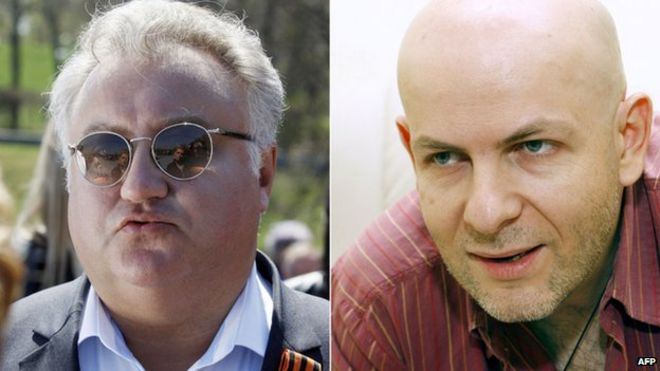
Oleg Kalashnikov and Oles Buzyna were found dead within hours of each other
How many Russians are fighting in Ukraine?
A Ukrainian nationalist group has said it was behind the deaths of two public figures in Kiev earlier this week.
Oleg Kalashnikov, a former MP, and Oles Buzyna, a writer and former newspaper editor, were gunned down in separate attacks within hours of each other.
A group calling itself the Ukrainian Insurgent Army claimed it carried out the killings in an email to political expert Volodomyr Fesenko.
Both of the victims were known for their strong anti-government views.
Kiev officials immediately questioned the authenticity of the claim.
The email received by Mr Fesenko was addressed to members of the Opposition Bloc, the successors to former President Viktor Yanukovych's Party of Regions. It fell apart after Mr Yanukovych fled the country last year.
In it, the group also said it was to blame for the deaths of several other politicians and officials linked to Mr Yanukovych, some of which were believed to be suicides.
The Insurgent Army, which is named after controversial Ukrainian nationalist partisans who fought during World War Two, said it was giving those it considered guilty of "anti-Ukrainian" activity until Monday to leave the country.
"We are unleashing a ruthless insurgency against the anti-Ukrainian regime of traitors and Moscow's lackeys. From now on, we will only speak to them using the language of weapons, all the way to their elimination," Mr Fesenko quoted the letter as saying.
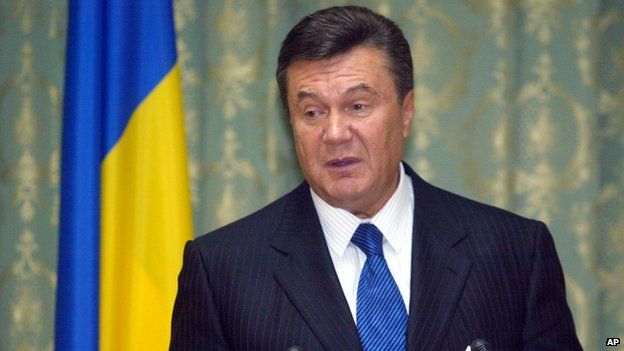
Former Ukrainian Prime Minister Viktor Yanukovych was ousted from power in 2014
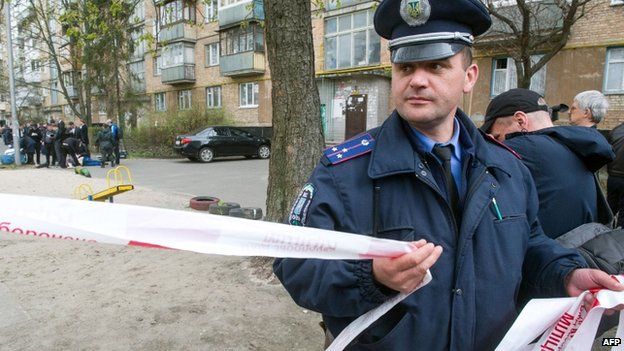
Ukraine's authorities have promised to investigate this week's murders
Mr Kalashnikov, a former MP from Mr Yanukovych's party, was found dead from gunshot wounds in his apartment block on Wednesday evening.
Hours later two masked assailants gunned down Oles Buzyna in the courtyard of his building.
Olena Bondarenko, a former MP from the Party of Regions, said Ukraine's interior ministry had agreed to provide her with security guards, after she received anonymous threats.
But Markiyan Lubkivsky, a spokesman for the security services, said "the authenticity of the email and the author's intentions" were questionable.
He said the email was sent from an address in Germany and contained grammatical mistakes not typical for a native Ukrainian speaker. This could not be independently verified.
Mr Lubkivsky also claimed that the Ukrainian Insurgent Army (UPA) did not exist.
Others disagreed. Anton Shevkhovtsov, a Ukrainian expert in far-right groups, said on Facebook that although he could not say who killed Mr Buzyna and Mr Kalashnikov, a group calling itself the UPA did indeed exist back in January, 2014.
Mr Shekovtsov said it was a "small radical nationalist group" among a number of organisations that had occupied Kiev City Hall. He also claimed he had interviewed its leader.
Ukrainian officials have promised an open and thorough investigation to track down the two men's killers.
But they also have already voiced a number of accusations, for which, they admit, at the moment they have no proof.
These include the prospect that Moscow was behind the murders, as a provocation. Russian officials deny the charge.
One scenario, in which they seem less interested, is the possibility that Mr Buzyna and Mr Kalashnikov were targeted after their personal information was published on a local website, just days before their shootings.
The site, called "The Peacekeeper" collects information on people who, it says, are "pro-Russian terrorists, separatists, mercenaries, war criminals, and murderers".
However, Anton Geraschenko, a top advisor to the Ukrainian interior ministry, played down the theory.
"I think it's a coincidence," he said, noting that the site gives information on thousands of people.
However, Gerashchenko is also a strong supporter of the site, having encouraged his Facebook followers to send information to it on suspected "terrorists and separatists".
http://www.bbc.com/news/world-europe-32361718
@Ill @Napoleon
But is it Russia knocking off loose links or this group?
By David SternBBC News, Kiev
- 3 hours ago
- From the sectionEurope

Oleg Kalashnikov and Oles Buzyna were found dead within hours of each other
How many Russians are fighting in Ukraine?
A Ukrainian nationalist group has said it was behind the deaths of two public figures in Kiev earlier this week.
Oleg Kalashnikov, a former MP, and Oles Buzyna, a writer and former newspaper editor, were gunned down in separate attacks within hours of each other.
A group calling itself the Ukrainian Insurgent Army claimed it carried out the killings in an email to political expert Volodomyr Fesenko.
Both of the victims were known for their strong anti-government views.
Kiev officials immediately questioned the authenticity of the claim.
The email received by Mr Fesenko was addressed to members of the Opposition Bloc, the successors to former President Viktor Yanukovych's Party of Regions. It fell apart after Mr Yanukovych fled the country last year.
In it, the group also said it was to blame for the deaths of several other politicians and officials linked to Mr Yanukovych, some of which were believed to be suicides.
The Insurgent Army, which is named after controversial Ukrainian nationalist partisans who fought during World War Two, said it was giving those it considered guilty of "anti-Ukrainian" activity until Monday to leave the country.
"We are unleashing a ruthless insurgency against the anti-Ukrainian regime of traitors and Moscow's lackeys. From now on, we will only speak to them using the language of weapons, all the way to their elimination," Mr Fesenko quoted the letter as saying.

Former Ukrainian Prime Minister Viktor Yanukovych was ousted from power in 2014

Ukraine's authorities have promised to investigate this week's murders
Mr Kalashnikov, a former MP from Mr Yanukovych's party, was found dead from gunshot wounds in his apartment block on Wednesday evening.
Hours later two masked assailants gunned down Oles Buzyna in the courtyard of his building.
Olena Bondarenko, a former MP from the Party of Regions, said Ukraine's interior ministry had agreed to provide her with security guards, after she received anonymous threats.
But Markiyan Lubkivsky, a spokesman for the security services, said "the authenticity of the email and the author's intentions" were questionable.
He said the email was sent from an address in Germany and contained grammatical mistakes not typical for a native Ukrainian speaker. This could not be independently verified.
Mr Lubkivsky also claimed that the Ukrainian Insurgent Army (UPA) did not exist.
Others disagreed. Anton Shevkhovtsov, a Ukrainian expert in far-right groups, said on Facebook that although he could not say who killed Mr Buzyna and Mr Kalashnikov, a group calling itself the UPA did indeed exist back in January, 2014.
Mr Shekovtsov said it was a "small radical nationalist group" among a number of organisations that had occupied Kiev City Hall. He also claimed he had interviewed its leader.
Ukrainian officials have promised an open and thorough investigation to track down the two men's killers.
But they also have already voiced a number of accusations, for which, they admit, at the moment they have no proof.
These include the prospect that Moscow was behind the murders, as a provocation. Russian officials deny the charge.
One scenario, in which they seem less interested, is the possibility that Mr Buzyna and Mr Kalashnikov were targeted after their personal information was published on a local website, just days before their shootings.
The site, called "The Peacekeeper" collects information on people who, it says, are "pro-Russian terrorists, separatists, mercenaries, war criminals, and murderers".
However, Anton Geraschenko, a top advisor to the Ukrainian interior ministry, played down the theory.
"I think it's a coincidence," he said, noting that the site gives information on thousands of people.
However, Gerashchenko is also a strong supporter of the site, having encouraged his Facebook followers to send information to it on suspected "terrorists and separatists".
http://www.bbc.com/news/world-europe-32361718
@Ill @Napoleon

But is it Russia knocking off loose links or this group?
88m3
Fast Money & Foreign Objects
Russian opposition parties form anti-Putin alliance
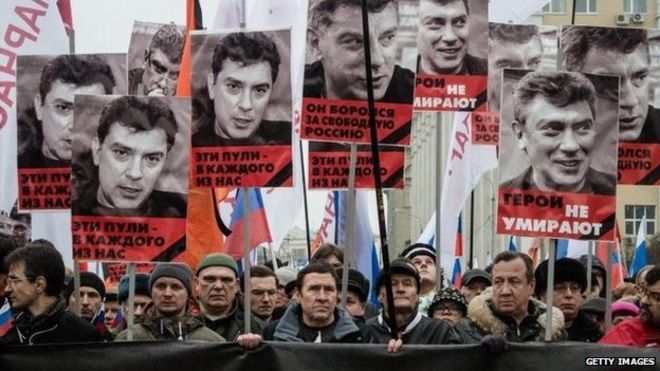
The party co-founded by murdered dissident Boris Nemtsov will form part of a loose opposition alliance
The political party founded by murdered Russian dissident Boris Nemtsov is to join forces with another opposition party ahead of Russia's 2016 elections.
RPR-Parnas will share a joint platform with the Party of Progress, founded by opposition activist Alexei Navalny.
Russia's political opposition has in recent years been riven by infighting, weakening its ability to challenge President Vladimir Putin.
A former deputy prime minister, Nemtsov was gunned down in Moscow in February.
http://www.bbc.com/news/world-europe-32356309
In a joint statement on Friday, the two parties called on opposition figures to "consolidate on a common platform of a rejection of lies, corruption and aggression".
Mikhail Kasyanov, co-chairman of RPR-Parnas and a former prime minister, said the parties would form an alliance rather than merge.
Mr Kasyanov later announced they had been joined by a third party, Democratic Choice, led by a former energy minister, according to Russia's Interfax news agency.
"We expect that our movement will continue and other opposition parties will join us," Mr Kasyanov said.
The parties said they would begin by running together in regional elections due to be held in 2015 before the full parliamentary elections due in 2016.
Mr Navalny, an activist and regular blogger, is among Russia's most prominent opposition figures. He has twice been convicted of embezzlement, spending time in jail in 2013 and receiving a three-and-a-half year suspended sentence in December last year.
Mr Navalny denied the charges in both cases, saying the trials were politically motivated.
Critics of Mr Putin accused him of being behind the murder of Mr Nemtsov, who was shot dead near Moscow's Red Square as he walked home with his partner.
Mr Putin denied having any involvement.
As the two parties made their announcement on Friday, Russia's state news agency released what it said was an extract from a confession by Mr Nemtsov's killer.
Zaur Dadayev, a Chechen policeman who was arrested with four alleged accomplices days after the murder, was initially said by authorities to have confessed to the crime.
But a member of Russia's human rights council who visited Mr Dadayev in prison said there was evidence the policeman had been tortured into giving his confession.
Mr Dadayev himself said there was no evidence against him, and that he had made a confession after being threatened with death.
http://www.bbc.com/news/world-europe-32356309
- 6 hours ago
- From the sectionEurope

The party co-founded by murdered dissident Boris Nemtsov will form part of a loose opposition alliance
The political party founded by murdered Russian dissident Boris Nemtsov is to join forces with another opposition party ahead of Russia's 2016 elections.
RPR-Parnas will share a joint platform with the Party of Progress, founded by opposition activist Alexei Navalny.
Russia's political opposition has in recent years been riven by infighting, weakening its ability to challenge President Vladimir Putin.
A former deputy prime minister, Nemtsov was gunned down in Moscow in February.
http://www.bbc.com/news/world-europe-32356309
In a joint statement on Friday, the two parties called on opposition figures to "consolidate on a common platform of a rejection of lies, corruption and aggression".
Mikhail Kasyanov, co-chairman of RPR-Parnas and a former prime minister, said the parties would form an alliance rather than merge.
Mr Kasyanov later announced they had been joined by a third party, Democratic Choice, led by a former energy minister, according to Russia's Interfax news agency.
"We expect that our movement will continue and other opposition parties will join us," Mr Kasyanov said.
The parties said they would begin by running together in regional elections due to be held in 2015 before the full parliamentary elections due in 2016.
Mr Navalny, an activist and regular blogger, is among Russia's most prominent opposition figures. He has twice been convicted of embezzlement, spending time in jail in 2013 and receiving a three-and-a-half year suspended sentence in December last year.
Mr Navalny denied the charges in both cases, saying the trials were politically motivated.
Critics of Mr Putin accused him of being behind the murder of Mr Nemtsov, who was shot dead near Moscow's Red Square as he walked home with his partner.
Mr Putin denied having any involvement.
As the two parties made their announcement on Friday, Russia's state news agency released what it said was an extract from a confession by Mr Nemtsov's killer.
Zaur Dadayev, a Chechen policeman who was arrested with four alleged accomplices days after the murder, was initially said by authorities to have confessed to the crime.
But a member of Russia's human rights council who visited Mr Dadayev in prison said there was evidence the policeman had been tortured into giving his confession.
Mr Dadayev himself said there was no evidence against him, and that he had made a confession after being threatened with death.
http://www.bbc.com/news/world-europe-32356309
88m3
Fast Money & Foreign Objects
Airlines Slash Routes to Moscow in Latest Sign of Russia's Growing Isolation
Carriers scratch flights as the number of foreign visitors declines and the plunging ruble keeps Russian vacationers at home
byCarol Matlack
8:57 AM EDT
April 17, 2015

Western sanctions and plunging oil prices are pushing Putin's Russia into recession.
Photographer: Akos Stiller/Bloomberg
In 2012, British discount airline EasyJet beat Virgin Atlantic Airways in a fierce competition for the rights to fly from London's Gatwick to Moscow's Domodedovo airport, a route that became available when its former operator was swallowed up in a merger. British aviation regulators gave the nod to EasyJet, which hailed the decision as a milestone in its international development.
Now, EasyJet has scaled back its London-Moscow service, from two daily flights to only one in each direction. The move, which took effect in late January, "was in response to the reduction in demand to and from Russia in recent months," an airline spokeswoman says.
The British discounter is one of many airlines curtailing flights to Russia and shelving planned expansion there, as the number of Russians vacationing abroad has plummeted and fewer foreign businesspeople and tourists are visiting the country.
For the airlines, it's a simple matter of supply and demand. But the reduced traffic at Russia's international airports mirrors the country's growing political isolation and weakened economic clout, as Western sanctions and lower oil prices push Russia into recession.
Once-shabby airports such as Moscow's Domodedovo, Sheremetyevo, and Vnukovo have been emblems of Russia's booming economy during most of President Vladimir Putin's tenure. All three airports underwent extensive renovations to accommodate traffic that has more than quadrupled since 2000 to a combined 77 million passengers in 2014, exceeding international hubs such as London Heathrow and Dubai. Those gleaming new terminals in Moscow are getting a lot quieter.
On Wednesday, Delta Air Lines announced it will suspend service to Moscow during the final three months of this year, meaning that no U.S. passenger carrier will fly to the Russian capital during that period. Delta has already trimmed its spring and summer service to Russia; it now flies only five times a week between New York City and Moscow, down from seven in 2014.
Hong Kong-based Cathay Pacific says it will end service to Moscow in June. And Air India, which had resumed flying from Delhi to Moscow in 2014 after a 15-year hiatus, cut back service to two flights a week in February after filling an average of only 47 percent of seats on the route. Others scaling back include Middle Eastern carriers Etihad and Qatar, as well as Czech Airlines, which is scrapping plans to serve the regional cities of Kazan, Kaliningrad, Perm, and Ufa this summer.
"We have been relocating the capacity freed in the Russian market, which has been experiencing a significant drop in demand," the company said in a statement.
Russian-based airlines are taking even more drastic steps, as the ruble's sharp decline has led to a more than 50 percent drop in the number of Russians traveling abroad, according to the government. The country's air-transportation agency reported on March 24 that Russian carriers were abandoning 71 international routes linking Russian cities to such destinations as Barcelona, Dubai, Tel Aviv, and Vienna. Carriers Transaero and UTAir accounted for most of the reductions.
http://www.bloomberg.com/news/artic...-in-latest-sign-of-russia-s-growing-isolation





Carriers scratch flights as the number of foreign visitors declines and the plunging ruble keeps Russian vacationers at home
byCarol Matlack
8:57 AM EDT
April 17, 2015

Western sanctions and plunging oil prices are pushing Putin's Russia into recession.
Photographer: Akos Stiller/Bloomberg
In 2012, British discount airline EasyJet beat Virgin Atlantic Airways in a fierce competition for the rights to fly from London's Gatwick to Moscow's Domodedovo airport, a route that became available when its former operator was swallowed up in a merger. British aviation regulators gave the nod to EasyJet, which hailed the decision as a milestone in its international development.
Now, EasyJet has scaled back its London-Moscow service, from two daily flights to only one in each direction. The move, which took effect in late January, "was in response to the reduction in demand to and from Russia in recent months," an airline spokeswoman says.
The British discounter is one of many airlines curtailing flights to Russia and shelving planned expansion there, as the number of Russians vacationing abroad has plummeted and fewer foreign businesspeople and tourists are visiting the country.
For the airlines, it's a simple matter of supply and demand. But the reduced traffic at Russia's international airports mirrors the country's growing political isolation and weakened economic clout, as Western sanctions and lower oil prices push Russia into recession.
Once-shabby airports such as Moscow's Domodedovo, Sheremetyevo, and Vnukovo have been emblems of Russia's booming economy during most of President Vladimir Putin's tenure. All three airports underwent extensive renovations to accommodate traffic that has more than quadrupled since 2000 to a combined 77 million passengers in 2014, exceeding international hubs such as London Heathrow and Dubai. Those gleaming new terminals in Moscow are getting a lot quieter.
On Wednesday, Delta Air Lines announced it will suspend service to Moscow during the final three months of this year, meaning that no U.S. passenger carrier will fly to the Russian capital during that period. Delta has already trimmed its spring and summer service to Russia; it now flies only five times a week between New York City and Moscow, down from seven in 2014.
Hong Kong-based Cathay Pacific says it will end service to Moscow in June. And Air India, which had resumed flying from Delhi to Moscow in 2014 after a 15-year hiatus, cut back service to two flights a week in February after filling an average of only 47 percent of seats on the route. Others scaling back include Middle Eastern carriers Etihad and Qatar, as well as Czech Airlines, which is scrapping plans to serve the regional cities of Kazan, Kaliningrad, Perm, and Ufa this summer.
"We have been relocating the capacity freed in the Russian market, which has been experiencing a significant drop in demand," the company said in a statement.
Russian-based airlines are taking even more drastic steps, as the ruble's sharp decline has led to a more than 50 percent drop in the number of Russians traveling abroad, according to the government. The country's air-transportation agency reported on March 24 that Russian carriers were abandoning 71 international routes linking Russian cities to such destinations as Barcelona, Dubai, Tel Aviv, and Vienna. Carriers Transaero and UTAir accounted for most of the reductions.
http://www.bloomberg.com/news/artic...-in-latest-sign-of-russia-s-growing-isolation





I read it has to do with the rise of far-right groups in Ukraine.Ukraine conflict: Email claim for Kiev killings
By David SternBBC News, Kiev
- 3 hours ago
- From the sectionEurope

Oleg Kalashnikov and Oles Buzyna were found dead within hours of each other
How many Russians are fighting in Ukraine?
A Ukrainian nationalist group has said it was behind the deaths of two public figures in Kiev earlier this week.
Oleg Kalashnikov, a former MP, and Oles Buzyna, a writer and former newspaper editor, were gunned down in separate attacks within hours of each other.
A group calling itself the Ukrainian Insurgent Army claimed it carried out the killings in an email to political expert Volodomyr Fesenko.
Both of the victims were known for their strong anti-government views.
Kiev officials immediately questioned the authenticity of the claim.
The email received by Mr Fesenko was addressed to members of the Opposition Bloc, the successors to former President Viktor Yanukovych's Party of Regions. It fell apart after Mr Yanukovych fled the country last year.
In it, the group also said it was to blame for the deaths of several other politicians and officials linked to Mr Yanukovych, some of which were believed to be suicides.
The Insurgent Army, which is named after controversial Ukrainian nationalist partisans who fought during World War Two, said it was giving those it considered guilty of "anti-Ukrainian" activity until Monday to leave the country.
"We are unleashing a ruthless insurgency against the anti-Ukrainian regime of traitors and Moscow's lackeys. From now on, we will only speak to them using the language of weapons, all the way to their elimination," Mr Fesenko quoted the letter as saying.

Former Ukrainian Prime Minister Viktor Yanukovych was ousted from power in 2014

Ukraine's authorities have promised to investigate this week's murders
Mr Kalashnikov, a former MP from Mr Yanukovych's party, was found dead from gunshot wounds in his apartment block on Wednesday evening.
Hours later two masked assailants gunned down Oles Buzyna in the courtyard of his building.
Olena Bondarenko, a former MP from the Party of Regions, said Ukraine's interior ministry had agreed to provide her with security guards, after she received anonymous threats.
But Markiyan Lubkivsky, a spokesman for the security services, said "the authenticity of the email and the author's intentions" were questionable.
He said the email was sent from an address in Germany and contained grammatical mistakes not typical for a native Ukrainian speaker. This could not be independently verified.
Mr Lubkivsky also claimed that the Ukrainian Insurgent Army (UPA) did not exist.
Others disagreed. Anton Shevkhovtsov, a Ukrainian expert in far-right groups, said on Facebook that although he could not say who killed Mr Buzyna and Mr Kalashnikov, a group calling itself the UPA did indeed exist back in January, 2014.
Mr Shekovtsov said it was a "small radical nationalist group" among a number of organisations that had occupied Kiev City Hall. He also claimed he had interviewed its leader.
Ukrainian officials have promised an open and thorough investigation to track down the two men's killers.
But they also have already voiced a number of accusations, for which, they admit, at the moment they have no proof.
These include the prospect that Moscow was behind the murders, as a provocation. Russian officials deny the charge.
One scenario, in which they seem less interested, is the possibility that Mr Buzyna and Mr Kalashnikov were targeted after their personal information was published on a local website, just days before their shootings.
The site, called "The Peacekeeper" collects information on people who, it says, are "pro-Russian terrorists, separatists, mercenaries, war criminals, and murderers".
However, Anton Geraschenko, a top advisor to the Ukrainian interior ministry, played down the theory.
"I think it's a coincidence," he said, noting that the site gives information on thousands of people.
However, Gerashchenko is also a strong supporter of the site, having encouraged his Facebook followers to send information to it on suspected "terrorists and separatists".
http://www.bbc.com/news/world-europe-32361718
@Ill @Napoleon
But is it Russia knocking off loose links or this group?
Basically with the leadership gone all the snakes come out so its wild over there
88m3
Fast Money & Foreign Objects
I read it has to do with the rise of far-right groups in Ukraine.
Basically with the leadership gone all the snakes come out so its wild over there
Long as democracy is at work



